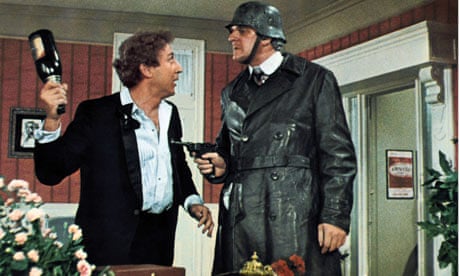Kenneth Mars, who has died aged 75 from pancreatic cancer, was cherished by audiences for his unhinged comic performances in two of the writer-director Mel Brooks's finest and funniest movies, The Producers (1968) and Young Frankenstein (1974). Along with performers including Gene Wilder, Madeline Kahn and Cloris Leachman, he created some of the most sublimely silly moments in US film comedy.
For all that, he longed for his acting range to be recognised. Asked in 2001 what he would change about the perception of himself, he replied: "That I am only a comedic actor – I would like to be considered for more dramatic roles." Small wonder, then, that he cited as his favourite among his own work the little-seen 1971 drama Desperate Characters, in which he appeared opposite Shirley MacLaine and gave what the critic Roger Ebert called "a deeply felt, complex performance" as a New York lawyer whose marriage is disintegrating.
Mars was born in Chicago, Illinois, the son of the stand-up comic and radio star Sonny Mars. He showed an interest in acting from an early age. After graduating from Northwestern University, he landed an acting job in 1963 on the popular sitcom Car 54, Where Are You? Further television work followed on Get Smart and Gunsmoke, before Mars took a regular role in 1967 playing a firefighter on the sitcom He & She. At the same time, Brooks, who was making his film debut after more than a decade of writing for Sid Caesar, gave Mars his first movie part.
Franz Liebkind was only a supporting character in The Producers, Brooks's film about a crooked impresario who persuades his accountant to join him in mounting a surefire Broadway flop and pocketing all the investors' money. But as Liebkind, the pigeon-fancying Nazi playwright responsible for Springtime for Hitler (memorably subtitled A Gay Romp with Eva and Adolf at Berchtesgaden), Mars managed to steal every scene he was in – no mean feat considering he was sharing the screen with the rambunctious comic tornado that was Zero Mostel.
It helped that Brooks gave the character a good share of outrageous lines. "Hitler – there was a painter," declares Liebkind fondly. "He could paint an entire apartment in one afternoon. Two coats." But Mars tore into the part with astonishing gusto, bringing a genuine air of derangement, as well as hints of childlike self-absorption, to the hopelessly misguided Liebkind.
Mars followed The Producers with a small role in Butch Cassidy and the Sundance Kid (1969), and TV appearances on The Debbie Reynolds Show and The Ghost & Mrs Muir, among others. He received another opportunity to indulge his skill for flamboyant characterisation and absurdly strangulated diction when Peter Bogdanovich cast him in What's Up, Doc?, a gleeful 1972 homage to the golden age of screwball comedy. As had been the case in The Producers, Mars's character – a preening, velvet-suited geologist – represented one buffoon among a parade of eccentrics. But his performance further demonstrated his comic daring, as well as his knack for beautifully timed ensemble work.
He accepted more television jobs, starring as Bette Davis's put-upon son in Hello Mother, Goodbye!, a 1974 feature-length pilot that never became a series. In the same year he was reunited with Brooks for the affectionate horror spoof Young Frankenstein. Playing Inspector Kemp, a crazed policeman leading the hunt for the rampaging Creature, Mars again delivered Brooks's priceless dialogue in an accent which suggested he was eating his own tongue.
This time he had some memorable comic accoutrements at his disposal, including a wildly unpredictable wooden arm and a monocle worn over an eyepatch. He also got some of the straight parts he craved so much, notably in two highly regarded, disquieting thrillers – The Parallax View (1974) and Night Moves (1975). Thereafter, television continued to consume the bulk of Mars's energies, with a long tally of parts in successful series such as Police Woman, Barney Miller, Hart to Hart and Cagney & Lacey. These were punctuated by occasional movie roles – the Pythonesque comedy Yellowbeard (1983), written by Graham Chapman and Peter Cook; vehicles for Goldie Hawn (Protocol) and Chevy Chase (Fletch), both in 1985; and minor roles in two Woody Allen pictures, Radio Days (1987) and Shadows and Fog (1991).
By this time, Mars's career had taken a new turn, and he had become one of the industry's most in-demand actors for animation voice-work. The highpoint came when he played King Triton in The Little Mermaid (1989), the film widely credited with reviving the fortunes of Walt Disney; other credits include Garfield and Friends, Rugrats and no less than 11 straight-to-video sequels to the prehistoric animated adventure The Land Before Time. Mars did not remain entirely hidden in the dubbing booth, and proved popular in front of the camera in recent years with a recurring role in the snappy sitcom Malcolm in the Middle.
He is survived by his wife, Barbara Newborn, whom he married in 1977, two daughters and six grandchildren.
Kenneth Mars, actor, born 14 April 1935; died 12 February 2011
